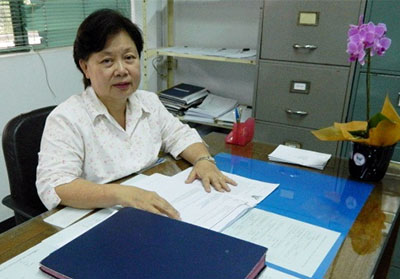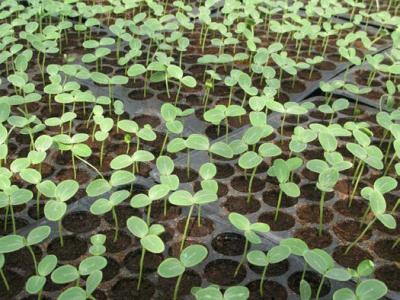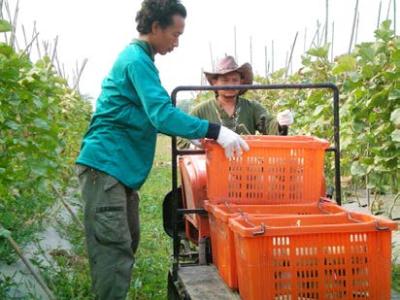Special Interview with Dr. Amporn Winotai
Last updated: 29 October 2013 | 14:25

Dr. Amporn has been working as Chief of BiologicalControl Research Group, Plant Protection Researchand Development Office, the Department ofAgriculture (DoA) in Thailand. She is also responsibleas the Lead Technical Laision Officer for the ASEAN Biocontrol for Sustainable Agri-food System Project.
What is the DOA’ s mission and what is its role in the ASEAN Biocontrol (ABC) Project?
The Department of Agriculture (DOA) is the leading plant and agricultural machinery research and development agency and it is also the main international certification centre for agricultural products. Regarding natural resources and environmental conservation, the DOA plays a leading role in the implementation of research and development into agricultural production processes that are appropriate to a particular area’ s natural resources and environmental landscape. Another critical component is the implementation of practices that guarantee biological safety and ensure secure and sustainable agricultural development. As the host agency on behalf of the Thai Government, the DOA provides facilities for the Project Coordination Unit (PCU) and collaborates in PCU’ s implementation. A working group to produce collaborative research alongside ASEAN technical experts has been established. The main functions of the working group is to conduct research, shareand transfer biocontrol knowledge (that can be applied to beneficial use in ASEAN countries) as well as to lead research and development on biocontrol application and harmonize ASEAN bio-pesticide registration procedures.
What is the current status and trend in the use of biocontrol inputs in ASEAN countries in general?
Most ASEAN farmers still prefer to use chemical pesticides because they are readily available on the market. Moreover, farmers see quick results after each chemical application. They are not yet aware of the adverse effects of pesticides on their health and the environment. Biocontrol has been promoted, however, quality bio-agents are in short supply. They are not produced in sufficient quantity to meet the farmers’ level of demand. Consequently, when farmers do not have access to bio-agents, their only option is to use agrochemicals.
What are the main challenges to using biological control agents (BCAs) in ASEAN countries and what are the prospects for their successful implementation?
In Thailand, the Ministry of Agriculture and Cooperatives has a plant production policy for Thailand to become the “ Kitchen of the World” . Farmers must be able to produce safe food. The Department of Environment, therefore, has a policy to promote research and development and the use of biocontrol to reduce the use of chemical pesticides in food production and apply lessons learned to other ASEAN countries to sustainably promote safe food production for the world.
Why do you think Thailand has been chosen as the host country?
 Thailand, particularly the DOA, has comprehensive research and development expertise into insect pathogens (bacteria, viruses, nematodes and fungus) and predator and parasitoids and plant extracts to control insect pests. Field applications of bio-agents have undergone intensive testing and yielded valuable results. Examples are the use of the nuclear polyhedrosis virus (NPV) and Bacillus thuringiensis (Bt) to control caterpillars in vegetables, fruit trees and orchids; the use of the Anagyrus wasp (Anagyrus lopezi) to control the cassava mealybug; the use of the Trichogramma wasp to control sugarcane stalk and shoot borer; and the use of neem extract to control vegetable pests.
Thailand, particularly the DOA, has comprehensive research and development expertise into insect pathogens (bacteria, viruses, nematodes and fungus) and predator and parasitoids and plant extracts to control insect pests. Field applications of bio-agents have undergone intensive testing and yielded valuable results. Examples are the use of the nuclear polyhedrosis virus (NPV) and Bacillus thuringiensis (Bt) to control caterpillars in vegetables, fruit trees and orchids; the use of the Anagyrus wasp (Anagyrus lopezi) to control the cassava mealybug; the use of the Trichogramma wasp to control sugarcane stalk and shoot borer; and the use of neem extract to control vegetable pests.  Moreover, the DOA has conducted intensive research and development into antagonists to control bacterial and fungal plant pathogens. This research has also yielded great results in the production and application of protozoa bait for rodent control in oil palm plantations and communities. Regarding the commercial scale production of bio-agents, Thailand has transferred knowledge production of bio-agents en masse to private companies in order for them to commercially produce and market the bioagents for easy access to farmers.
Moreover, the DOA has conducted intensive research and development into antagonists to control bacterial and fungal plant pathogens. This research has also yielded great results in the production and application of protozoa bait for rodent control in oil palm plantations and communities. Regarding the commercial scale production of bio-agents, Thailand has transferred knowledge production of bio-agents en masse to private companies in order for them to commercially produce and market the bioagents for easy access to farmers.
What are your suggestions for the project to achieve your expectations?
There is a critical need to promote both awareness and understanding of biocontrol of agricultural pests to farmers, thereby leading to their more extensive use and better acceptance of biocontrol use among farmers. There is also a need to establish a research network on bio-agent production and its application in pest control in ASEAN Member States. It is also crucially important to strengthen, develop and advocate the development of appropriate agricultural bioproduct registration procedures that achieve both ASEAN and global acceptance.